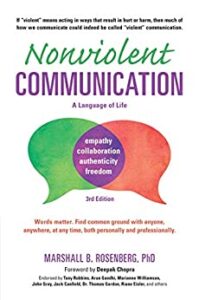Chapter 8 – The Power of Empathy, page 113.
- “When someone really hears you without passing judgment on you, without trying to take responsibility for you, without trying to mold you, it feels damn good!” – Carl Rogers
- When we work in a hierarchically structured institution, there is a tendency to hear commands and judgments from those higher up in the hierarchy.
- While we may easily empathize with our peers and with those in less powerful positions, we may find ourselves being defensive or apologetic, instead of empathetic, in the presence of those we identify as “superiors.”
- It’s harder to empathize with those who appear to possess more power, status, or resources.
Empathy and the Ability to Be Vulnerable
- Because we are called to reveal our deepest feelings and needs, we may sometimes find it challenging to express ourselves in NVC.
- Self-expression becomes easier, however, after we empathize with others.
- The more we connect with the feelings and needs behind their words, the less frightening it is to open up to other people.
- The situations where we are the most reluctant to express vulnerability are often those where we want to maintain a “tough image” for fear of losing authority or control.
Using Empathy to Defuse Anger
- The ability to offer empathy to people in stressful situations can defuse potential violence.
- When we listen for feelings and needs, we no longer see people as monsters.
- It may be difficult to empathize with those who are closest to us.
Empathy in Hearing Someone’s “No!”
- Because of our tendency to read rejection into someone else’s “no” and “I don’t want to…,” these are important messages for us to be able to empathize with.
- If we take their “No!” personally, we may feel hurt without understanding what’s actually going on within the other person.
- When we shine the light of consciousness on the feelings and needs behind someone else’s no,” however, we become cognizant of what prevents them from responding as we would like.
Empathy to Revive a Lifeless Conversation
- We have all found ourselves in the midst of a lifeless conversation.
- Vitality drains out of a conversation when we lose connection with the feelings and needs generating the speaker’s words and with the requests associated with those needs.
- This effect is common when people talk without consciousness of what they are feeling, needing, or requesting.
- Instead of being engaged in an exchange of life energy with other human beings, we see ourselves becoming wastebaskets for their words.
- How and when do we interrupt a dead conversation to bring it back to life? I’d suggest the best time to interrupt is when we’ve heard one more word than we want to hear. The longer we wait, the harder it is to be civil when we do step in.
- Our intention in interrupting is not to claim the floor for ourselves, but to help the speaker connect to the life energy behind the words being spoken.
- So, to bring a conversation back to life, interrupt with empathy.
- Another way to bring a conversation back to life is to openly express our desire to be more connected and to request information that would help us establish that connection.
- I have discovered that conversations that are lifeless for the listener are equally so for the speaker.
- Speakers prefer that listeners interrupt rather than pretend to listen.
Summary
- Our ability to offer empathy can allow us to stay vulnerable, defuse potential violence, hear the word no without taking it as a rejection, revive a lifeless conversation, and even hear the feelings and needs expressed through silence.

